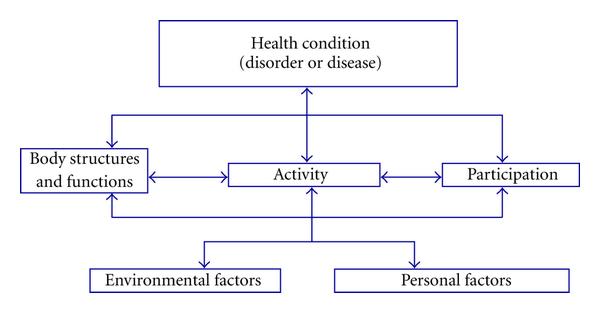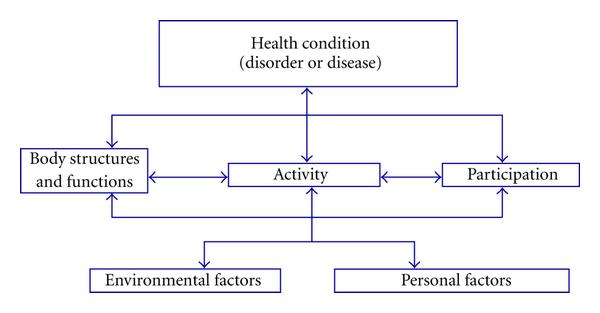Great to see increasing acknowledgement internationally of the importance of Rehabilitation in helping #COVID19 survivors who experience disability after their illness.
Some thoughts on the philosophy of #disability and how coronavirus can help us understand it.
(1/n) https://twitter.com/StevenFaux/status/1248419681150464002">https://twitter.com/StevenFau...
Some thoughts on the philosophy of #disability and how coronavirus can help us understand it.
(1/n) https://twitter.com/StevenFaux/status/1248419681150464002">https://twitter.com/StevenFau...
Disability is the combination of:
1) Impairment in body structure/ function (e.g. weak leg muscles);
2) Activity limitations (difficulty running) and;
3) Participation restrictions (can& #39;t play a game of football w/ friends)
These interact with contextual factors (2/n)
1) Impairment in body structure/ function (e.g. weak leg muscles);
2) Activity limitations (difficulty running) and;
3) Participation restrictions (can& #39;t play a game of football w/ friends)
These interact with contextual factors (2/n)
specific to each individual, which might include interests, motivation, family factors, community resources, education etc.
Rehab interventions are targeted at goals which are meaningful to the individual (i.e. don& #39;t just treat a condition because it exists). (3/n)
Rehab interventions are targeted at goals which are meaningful to the individual (i.e. don& #39;t just treat a condition because it exists). (3/n)
For me, the profound things about viewing disability in this way are:
1. Disability is framed as something anyone can experience, even transiently. It is not another category of being for some other category of people. We all exist on a continuum of health and disability. (4/n)
1. Disability is framed as something anyone can experience, even transiently. It is not another category of being for some other category of people. We all exist on a continuum of health and disability. (4/n)
2. If disability can be experienced by everyone, then people who experience disability are not othered by society; they are as entitled to participate in their own lives as anyone.
Viewed that way, the support the State is morally obligated to provide isn& #39;t "extra help" (5/n)
Viewed that way, the support the State is morally obligated to provide isn& #39;t "extra help" (5/n)
but rather the bare minimum to which each citizen is entitled. We routinely fail people in this.
3. The medical model of disability is debunked. A diagnosis is, as we know, a completely insufficient description of any person to whom it applies. FUNCTION is the focus. (6/n)
3. The medical model of disability is debunked. A diagnosis is, as we know, a completely insufficient description of any person to whom it applies. FUNCTION is the focus. (6/n)
4. Finally, this philosophy ought to promote interdisciplinary working and shared goal-setting with patients; they own their goals, not us, although we may help guide them. Rehabilitation leaders lead from behind.
(7/n)
(7/n)
So, how does this all apply to coronavirus?
Well, in adults, early data suggest that there may be significant morbidity for survivors. Even young healthy adults with mild illness report difficulty returning to baseline fitness to do things like go up a flight of stairs. (8/n)
Well, in adults, early data suggest that there may be significant morbidity for survivors. Even young healthy adults with mild illness report difficulty returning to baseline fitness to do things like go up a flight of stairs. (8/n)
Older people or those who were more severely unwell may have significant difficulties with getting back to walking independently, managing daily self-care activities, getting back to the sports they enjoy etc. Being bed-bound for weeks can cause significant deconditioning. (9/n)
Most people can understand implicitly that part of "getting better" for people like this will involve not just treating pneumonia, but also getting people back to their lives again.
i.e. we accept, at least some of the time, that FUNCTION is part of health.
(10/n)
i.e. we accept, at least some of the time, that FUNCTION is part of health.
(10/n)
Most people will not think of those convalescing from COVID19 as being "disabled" by it, but I& #39;d like to challenge that and encourage people to think differently about disability.
(if this idea seems confronting, you may be clinging to a traditional model of disability) (11/n)
(if this idea seems confronting, you may be clinging to a traditional model of disability) (11/n)
Taking the WHO& #39;s structure, post-COVID19 disability might look like this:
1. Muscle weakness, fatiguability, breathlessness, reduced exercise capacity (for example)
2. Limited ability to walk for more than 5 mins.
3. Can& #39;t go on hillwalks with friends, or do the shopping. (12/n)
1. Muscle weakness, fatiguability, breathlessness, reduced exercise capacity (for example)
2. Limited ability to walk for more than 5 mins.
3. Can& #39;t go on hillwalks with friends, or do the shopping. (12/n)
COVID-19 will cause some survivors to experience disability; this will thankfully be transient in most cases.
I don& #39;t think anyone would argue that those survivors ought not receive rehabilitation support to achieve their goals and optimise function. (13/n)
I don& #39;t think anyone would argue that those survivors ought not receive rehabilitation support to achieve their goals and optimise function. (13/n)
People who fit more easily into the traditional model of what disability looks like ought not be considered different to COVID-19 survivors in terms of their absolute right to access rehabilitation and participate meaningfully in their own lives.
(14/n)
(14/n)
People (children AND adults) whose disabilities result from spinal injury, or cerebral palsy, or brain injury are as entitled to rehabilitation as people trying to get back on their feet after coronavirus. When that is accepted by all, we will have achieved something. (15/n)
Coronavirus offers us an opportunity to examine our biases and priorities. If we can revolutionise our system overnight to save lives, when this is over I hope we can revolutionise it to demonstrate we care equally for everyone.
(16/16)
(16/16)

 Read on Twitter
Read on Twitter



